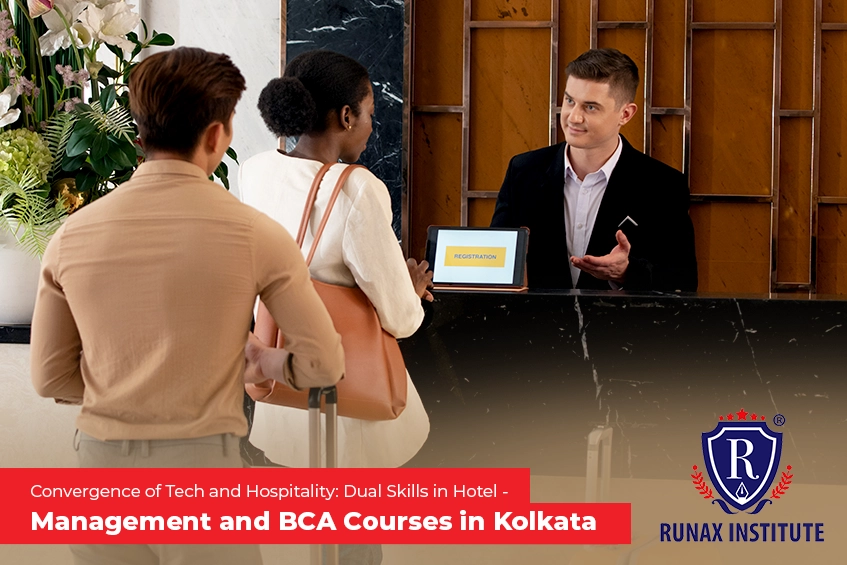Introduction
The hospitality industry isn’t just about greeting guests with a smile anymore. It’s about managing guest data, automating room service, and building apps that allow travellers to book their dream getaway from their phones. At the same time, tech jobs are evolving, demanding more than just code. They need context, and hospitality is the perfect sandbox.
In Kolkata, a fascinating trend is emerging. Students are bridging the gap between two seemingly different disciplines: hospitality and tech. With institutes offering both hotel management and BCA courses in Kolkata, students are gaining a unique dual skill set that fits the future of both industries.
This article explores how this hotel management tech integration crossover is being encouraged, what it means for the industry, and why Kolkata might just be leading the charge.
The Emergence of Dual-Skilled Professionals in Kolkata
The distinction between hospitality and IT is rapidly becoming more hazy. Guests now expect digital room controls, contactless check-ins, and mobile concierge services. Hotels expect professionals who understand backend systems, data privacy, and smart operations.
Enter the dual-trained graduate. Students from a BCA college in Kolkata are not just learning coding, databases, and app development. Many are now exploring hospitality contexts through electives and projects. At the same time, students pursuing a hotel management course in Kolkata are getting exposure to the technical backbones that run today’s smart hotels.
This dual path is creating talent with cross-functional understanding—equally comfortable talking to developers and front office staff. It’s a response to industry demand for hybrid professionals who can implement tech-driven hotel operations and drive innovation across departments.
Curriculum Fusion: Integrating Tech Modules into Hotel Management Courses
Hotel management education in Kolkata is rapidly evolving. Institutes are embedding technical modules directly into hospitality training. Students now interact with Property Management Systems courses, learning how platforms like Opera and IDS Next streamline front desk, housekeeping, and revenue management functions.
The curriculum includes lessons in hospitality data analytics in Kolkata, where students interpret guest behaviour and feedback using dashboards and visualisation tools. There’s training in hotel PMS programming that equips learners with the skills to troubleshoot or even customise the systems running core hotel functions.
Several institutes offering a BCA course in Kolkata also incorporate software demos, API basics, and guest software simulations into operations management. This isn’t just theory. It’s a full-blown digital hospitality education in Kolkata, preparing future hoteliers to be tech-aware, if not tech-savvy.
Tech-Enriched BCA Programs with Hospitality Electives
Tech education isn’t staying in its silo either. BCA in Kolkata with a hospitality focus now include modules that mirror the needs of hospitality operations.
Think of a BCA student building a restaurant management app, or scripting the backend of a guest experience software that tracks preferences and automates services. Some electives include IoT in the hospitality curriculum, where students prototype devices like keyless door entries or smart thermostats.
Instructors also introduce students to hospitality UX/UI design training, ensuring tech products don’t just work but are intuitive for non-technical users like hotel staff or guests. These hybrid courses ensure students understand both the code and the customer.
Cross-Departmental Projects: Real-World Applications
Theory can only take you so far. That’s why institutes are getting creative. Through cross-functional hospitality projects, students from the hotel management and BCA departments collaborate on hands-on solutions.
One group might build a hotel booking system engineering prototype. Another could develop a mobile app for smart hotel solutions like voice-activated room service. Projects sometimes go further, integrating hybrid hospitality-tech internships with real hotels, where students deploy and test what they’ve built.
These projects simulate real-world dynamics, from user feedback to software patches. They’re an invaluable part of preparing students for complex, interdisciplinary workplaces.
Competitive Edge: Graduate Employability and Career Expansion
The biggest win? These students graduate with a competitive edge. Dual-trained individuals can walk into interviews for positions like hospitality startup tech roles, system analysts at hotel chains, or developers in smart hospitality trends in Kolkata.
Hotels love them because they understand both service and software. Startups love them because they can ideate and execute. BPOs, travel apps, hotel chains, and even government tourism boards are beginning to look for such talent.
These students don’t just take jobs—they create roles that didn’t exist before. They shape how digital hospitality education in Kolkata evolves with real-world relevance.
Institutional Ecosystem: Kolkata’s Unique Educational Advantage
Kolkata stands out as a city where interdisciplinary education doesn’t just exist—it thrives. A major strength lies in how institutions like the RUNAX Institute of Hotel Management offer both hospitality and BCA courses in Kolkata under the same roof. This creates a seamless environment for tech and hospitality students to collaborate.
What makes this ecosystem powerful is the institutional structure itself. Faculty from the hotel management side regularly co-teach modules with IT experts, combining lessons in guest services with real-time restaurant management app development. In these shared learning spaces, students take BCA hospitality electives in Kolkata that cover topics such as UI/UX for hotel interfaces, API integrations for booking systems, and CRM automation in hotel operations.
Joint capstone projects and innovation boot camps let students from both tracks build functioning tech tools for hotels—everything from smart kiosks to predictive maintenance dashboards. These hands-on sessions are often supported by mentorship from industry professionals across both domains.
The city’s educational institutions also maintain close connections with local hotels, hospitality start-ups, and software companies. This creates a robust pipeline for hybrid hospitality-tech internships, giving students the chance to implement classroom concepts in real business environments. It’s this synergy of disciplines, real-world exposure, and academic support that gives Kolkata’s graduates a major edge in the evolving world of tech-enabled hospitality training.
More importantly, Kolkata’s institutions maintain strong ties with local hotels, IT firms, and travel tech startups, opening up mentorship and internship opportunities.
Future Trends: Preparing for the Next Wave of Hospitality Tech
Hospitality tech is moving faster than a room-service robot on a double espresso. Guests expect seamless, intuitive, and personalised experiences, all powered by technology. From voice-activated lighting to predictive room service suggestions based on past orders, the sector is embracing a digital-first future.
Institutes in Kolkata are responding. Students are diving into next-gen concepts like IoT in the hospitality curriculum, where smart sensors manage temperature, lighting, and even scent. They’re building interfaces for guest experience software development that analyse behaviour to customise offers. As hospitality design and sustainability become entwined, students are learning to embed energy-efficient hotel operations into systems architecture.
They’re also exploring hospitality UX/UI design training, ensuring apps not only function but also delight. From biometric access systems to AR-guided lobby tours, every idea focuses on blending human warmth with machine precision. And since this field keeps evolving, institutes encourage continuous innovation, pushing students to lead the next wave of smart hospitality trends in Kolkata.
Conclusion: Dual-Skilled Graduates as the Future of Hospitality in Kolkata
In a world where service is powered by software, hospitality needs tech-savvy professionals who understand both emotion and execution. Kolkata is fostering this future with institutions that don’t force students to choose between disciplines—they let them fuse them.
The combination of a BCA course in Kolkata and hotel management training is more than a resume booster. It’s a career accelerator. These students become bridge-builders in organisations, connecting backend systems with front-end service, and strategy with experience.
For students, the message is simple: the future of hospitality is digital. And if you want to lead it, start in Kolkata.
Frequently Asked Questions
1. What is a dual skill in BCA and Hotel Management?
It refers to gaining technical expertise in computing (BCA) along with hospitality operations, preparing students for tech-enabled hospitality careers.
2. Are there institutes in Kolkata that offer both BCA and Hotel Management?
Yes, institutes like the RUNAX Institute of Hotel Management offer both programs, facilitating collaboration, shared projects, and hybrid skill development.
3. What kind of jobs can I get with this dual expertise?
Roles in hotel tech operations, guest analytics, UX design for hospitality apps, and tech innovation in hospitality startups.
4. Do BCA courses in Kolkata offer hospitality electives?
Many colleges now include electives on hospitality software, guest systems, and app development tailored to hotel use cases.
5. Is the trend of combining BCA and hotel management growing?
Absolutely. As hospitality embraces technology, the demand for professionals with both sets of skills is steadily increasing.






